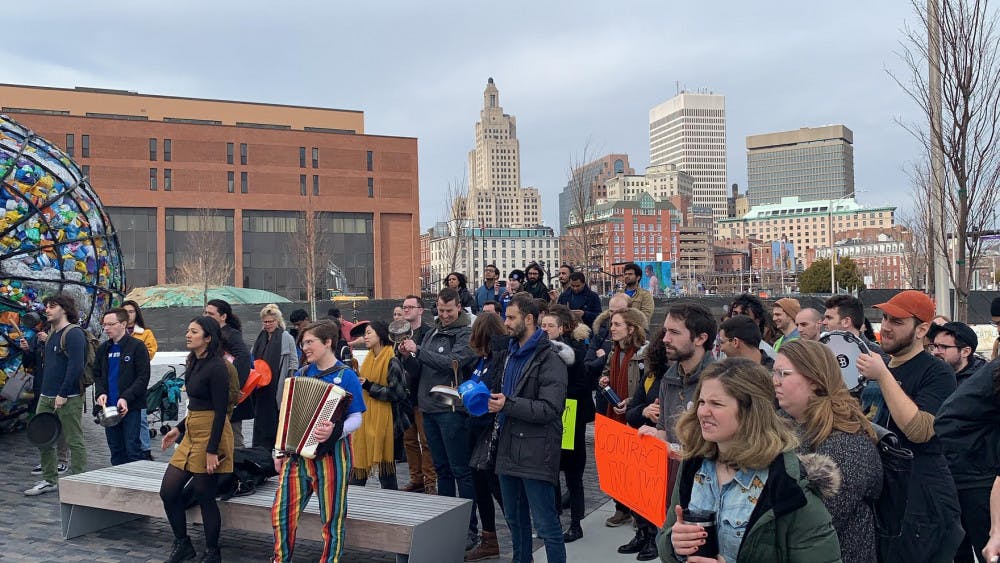“What do we want? Contract! When do we want it? Now! If we don’t get it? Shut it down.”
Chanting to beats banged out on pots and pans, over 100 graduate students and allies marched from the Van Wickle Gates to 225 Dyer Street yesterday, where bargaining committee members of the graduate student union Stand Up for Graduate Student Employees met with members of University administration to negotiate for a union contract.
“The point of marching the bargaining committee down there was to show that there is an entire union behind the six people that are in the room,” said Rithika Ramamurthy GS, chair of the SUGSE bargaining committee. “It’s not just eight to 10 voices, it’s an entire student body that supports us.”
According to Ramamurthy, University administrators frequently refer to budget limitations as a reason that they hesitate to accept the union’s demands. Despite a recent increase in tuition, as The Herald previously reported, she noted the absence of a proportionate change to graduate student workers’ resources or wages.
SUGSE has been negotiating with the University for just under a year, The Herald previously reported. Since its inception in 2014, the organization has successfully advocated for a number of changes, including dental insurance for graduate student workers and protecting funding for sixth-year students.
A flier distributed by the Union noted several concessions won on behalf of graduate students by the bargaining committee, including “more control over class sizes and limits on work hours, more protections for victims of harassment and discrimination and independent grievance procedures to enforce those protections.” Proposals of graduate student benefits that SUGSE says the University administration has not accepted include a stipend raise, a vision plan, affordable health insurance coverage for dependents and improvements to the current dental plan.
A SUGSE press release following the rally stated that this march aimed to pressure administration to accept the final terms of the agreement, which cannot be enacted until both parties agree on all aspects of the proposed contract.
The University has also not committed to continued bargaining if the National Labor Relations Board enacts a proposed rule allowing private universities to refuse to recognize graduate student unions. This enactment would overturn a ruling established during the Obama administration that created opportunities for collective bargaining. According to a pre-election agreement signed in June 2018 by the University, SUGSE and its union affiliate — the American Federation of Teachers — the University would have “no further obligations to the union” if the rule were to take force before the University and the union reached a collective bargaining agreement, The Herald previously reported.
The Tuesday afternoon protest integrated elements of the cacerolazo, a type of protest frequent in Latin America distinguished by the use of household items to create a loud collective noise. Melody Chapin GS, one of the protest organizers, said that engaging in this form of protest was “not only to make some noise, but to join in solidarity with the rest of the world, especially Latin America … in a larger fight for equality.”
Several members of the Providence community were among the hundred-plus attendees. Rhode Island Federation of Teachers and Healthcare Professionals President Francis Flynn participated, telling marchers in a speech that he and his organization were “thrilled (the protesters) are out here today … because (they) are advocating for better worker conditions for all of (themselves).”
“Unions in general are very important for building workplace democracy and for ensuring that workers have a say in their working conditions,” as well as in their pay and benefits and that they have “some degree of collective power to determine how their work is carried out,” said Siraj Sindu GS, a member of the SUGSE Bargaining Committee.
Moving forward, SUGSE leaders intend to organize weekly pickets to continue demanding attention and progress from the University administration. “We’re not willing to compromise on things we think are important to us,” Ramamurthy said. “Grads from all across the board suffer from economic insecurity, and we don’t … want to accept anything less than we deserve.”

Jack Walker served as senior editor of multimedia, social media and post- magazine for The Herald’s 132nd Editorial Board. Jack is an archaeology and literary arts concentrator from Thurmont, Maryland who previously covered the Grad School and staff and student labor beats.





